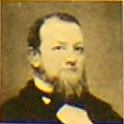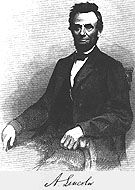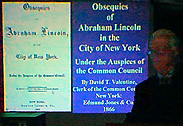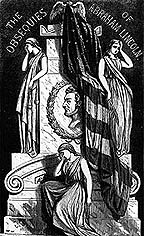
|
C. GODFREY GUNTHER
NYC's 77th mayor (1864-66) first held public office on the Alms House Board of Governors that ran the welfare institutions and jails. Elected to it in 1854, he became its President in 1857.
|

|
President's portrait from
The Obsequies of
Abraham Lincoln
in the City of New York, whose publication Mayor Gunther opposed.
|
C. Godfrey
Gunther:
the volunteer fireman &
jails
governor who became
NYC's 77th mayor. Though a
Copperhead, he helped
thwart Confederate terrorists
trying to burn down the city.
Though opposed to replacing
volunteer companies with a
paid force, he urged 'vol'
comrades to obey the law
setting it up. Though he
led the Lincoln's
obsequies,
he vetoed their publication. |
New Yorkers could include among the fascinating ironies with which history is replete this little known but interesting fact that NYCHS came across in researching Civil War era correctional governance:
The mayor who dealt with a Confederate terrorist arson attack on downtown New York and who later presided over the city's obsequies for Abraham Lincoln was C. Godfrey Gunther, a Copperhead Democrat who had served several years as an elected governor of the agency that managed the jails and almshouse.
He first became involved in public service as a volunteer fireman, the start of a life-long association with "fire vols." Long active in Tammany Hall, he eventually won his single mayoral term (1864-66) running as an dissident Peace Democrat against the Republican and Tammany candidates.

|
|
The author, right, almost invisible to the digital camera lens (even with a flash) in the darkened Science Library Standish Room of SUNY Albany, gives a slide presentation on Mayor Gunther's veto of The Obsequies of Abraham Lincoln in the City of New York.
Given during theResearching NY 2002: Perspectives on Empire State History conference, the presentation can be accessed on this web site under the title The Archival Resource That Nearly Wasn't using MS Internet Explorer, provided that PowerPoint is available on your computer. A special NYCHS newsletter describing the presentation, listing resources used in the research, and providing full texts of primary documents cited, also is available on the web site in downloadable and printable Adobe Acrobat (PDF) format.
|
While giving lip-service to preserving the Union, New York's Peace Democrats showed little support and less enthusiasm for Lincoln's war aims and policies. While most did not go as far as Mayor Fernando Wood's advocacy of New York seceding from the Union by declaring itself a neutral "free city," many did favor restoring the Union "as it was" with slavery intact in the secessionist states and with new states free to adopt slavery.
Precisely because so many in New York were supportive of the Southern cause, Confederate arsonists picked it as their target town to burn down. They hoped these sympathizers would join in crippling this city so important to the Union. But despite dozens of buildings being torched, the plot failed. Warned by Lincoln's top Cabinet members that just such an attack was being planned, Mayor Gunther alerted local military and civilian authorities. His fellow volunteer firefighters responded well. No lives were lost in that terrorist attack on New York.
But five months later, even as the war ended, another plot by Southern agents did take a life -- the President's. Quite aside from the mayor's own anti-Lincoln views, the requirements of mayoral office made necessary Gunther expressing sentiments of grief and participating in ceremonies of public mourning considered appropriate under the circumstances of Presidential assassination.
Yet only a few weeks later, the mayor vetoed a plan to preserve a printed record of the city's Lincoln obsequies in bound volumes for distribution to libraries and various other institutions. Fortunately for researchers today, the Boards of Aldermen and Councilmen overrode his veto. Consequently, the Municipal Reference and Research Center (the Municipal Archives "library") has copies, from one of which several of the images appearing on these C. Godfrey Gunther bio web pages were copied and scanned -- those with the added thick black borders (such as the Lincoln portrait above right).
The pages that follow provide a brief overview of the life and times of C. Godfrey Gunther, the volunteer fireman and jails governor who was elected mayor as an independent Peace Democrat. Despite some Southern sympathies, he helped thwart the Confederate plot to burn down the city and, despite presiding over the Lincoln obsequies in the city, he tried to prevent publication of the printed record of those funeral ceremonies.
The Webmaster, New York Correction History Society
|



